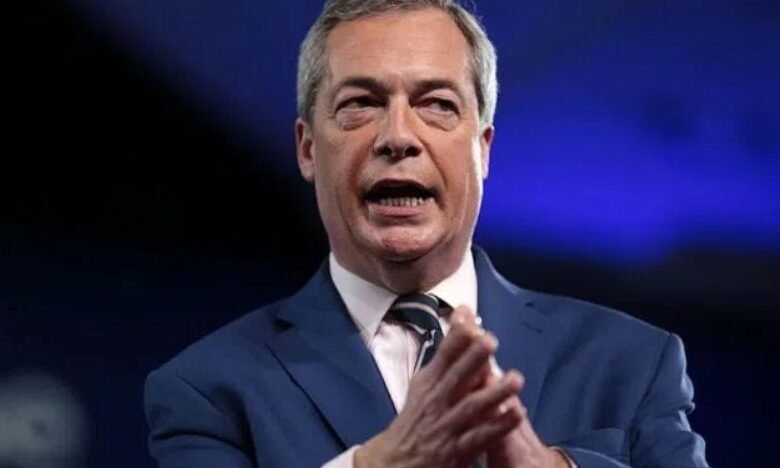
Former UKIP leader Nigel Farage is campaigning on behalf of people whose bank accounts have been closed– and has launched a new website to tackle de-banking. Farage, who says he plans to “build a powerful lobby group” that the Government “simply can’t ignore” after revealing that 1,000 bank accounts are closed each day, is being hailed as a consumer champion.
He has vowed to create a guide on how to flood banks with data requests as allies said his treatment by Coutts and NatWest had turned him into Britain’s newest “consumer champion”.
Former prime minister Liz Truss said she was “appalled” at the treatment of the former Ukip leader, whose bank account closure by Coutts sparked a crisis at its parent company NatWest.
Launching his campaign, Farage said he wants to “fight back against the big banks that have let us down”.
The Telepgraph reports: The former Ukip leader has set up a website, AccountClosed.org, which is aimed at helping people who have had financial services unfairly withdrawn.
“Everything tells me that this is a major national scandal that needs to be revealed and needs to be acted upon,” he told The Telegraph.
After having his own accounts at Coutts closed because his political views were deemed not to align with the bank’s values, Mr Farage last week welcomed the resignations of Dame Alison Rose, the chief executive of NatWest, which owns Coutts, and Peter Flavel, the Coutts chief executive.
He wants to significantly widen his campaign with AccountClosed.org, saying he decided to launch the website because “at the moment we don’t quite know the scale of the problem”.
He said he had been “overwhelmed” by members of the public sending him their own cases since revealing how his account was closed.
“I start work at four o’clock in the morning looking at all this stuff,” he added. “I’m beginning to have the impression this is much, much bigger than any of us could have contemplated.”
The website will try to establish in detail the various reasons why customers are having services withdrawn, with people invited to submit their own experiences along with the banks involved to help identify the “worst offenders”.
I’m launching a new campaign to fight back against the big banks that have let us down.
We need to understand the scale of this national scandal. Together, we can form a powerful group to lobby government.
You can visit the campaign website here: https://t.co/zm0d8IZyyU pic.twitter.com/QQXWO9FNEW
— Nigel Farage (@Nigel_Farage) July 29, 2023
‘We don’t want cash’
Based on what he has heard to date, Mr Farage’s “biggest worry” relates to small and medium-sized businesses – including banks allegedly threatening to close the accounts of enterprises reliant on cash.
“There are clearly a couple of things that have emerged,” he says. “Number one, a concerted attempt to drive out cash.
“You’re running a fish store? Well get a credit card machine – we don’t want cash. You’re a window cleaner? Sorry, we don’t want cash. A lot of that.
“I’ve got dozens of accounts of people saying to me that their bank is saying they are putting in too much cash, where’s the cash coming from, do they have the receipts to back up the cash?” He said accounts being closed on this basis has “happened to plenty of people”.
Investors in cryptocurrencies have also been affected, he added. “I had a 19-year-old today, telling me that he puts 50 quid a month into crypto. And the bank have said ‘nope, sorry, we don’t want your business’. So they’re even limiting how people spend money, which I find quite a shock.”
Expats and those receiving money from abroad have also run into trouble.
Mr Farage said the numbers getting their accounts closed because of “political opinion stuff”, as in his case, appear “not particularly huge”, but added: “The danger is it gets a lot bigger, as now through AI the banks are able to search the social media accounts of all of their customers. That’s very sinister and very worrying.”
‘Help me to help you’
He believes the full scale of de-banking has only just come to light because most victims “don’t say anything to anyone”. “They are embarrassed, they are humiliated. And they fear that, if they speak out in any way at all, it will damage their credit rating for the future. And there is strong evidence that’s true.”
The de-banking phenomenon, he thinks, has been driven by “complete overkill” in the application of anti-money laundering and “politically exposed person” directives, along with a creeping politicisation of banks.
Mr Farage claimed the latter issue is endemic throughout corporate culture, saying: “It has run through the public and private sectors at the most extraordinary speed, accelerated particularly by the Black Lives Matter movement.”
But, for the time being at least, he is focusing on banks, explaining: “It’s in banking that it’s not only reached its most extreme point, but it’s reached an industry that is as essential as water and electricity.
“There is a culture that has gone right through the whole of banking of being terrified, terrified of heavy fines, as keen to show their green credentials and their inclusivity as they are to get on with the business of banking.”




